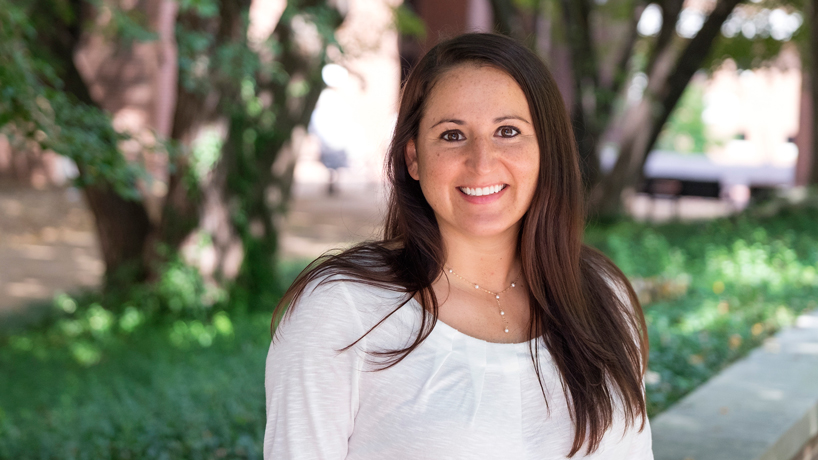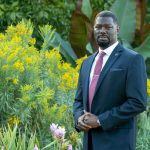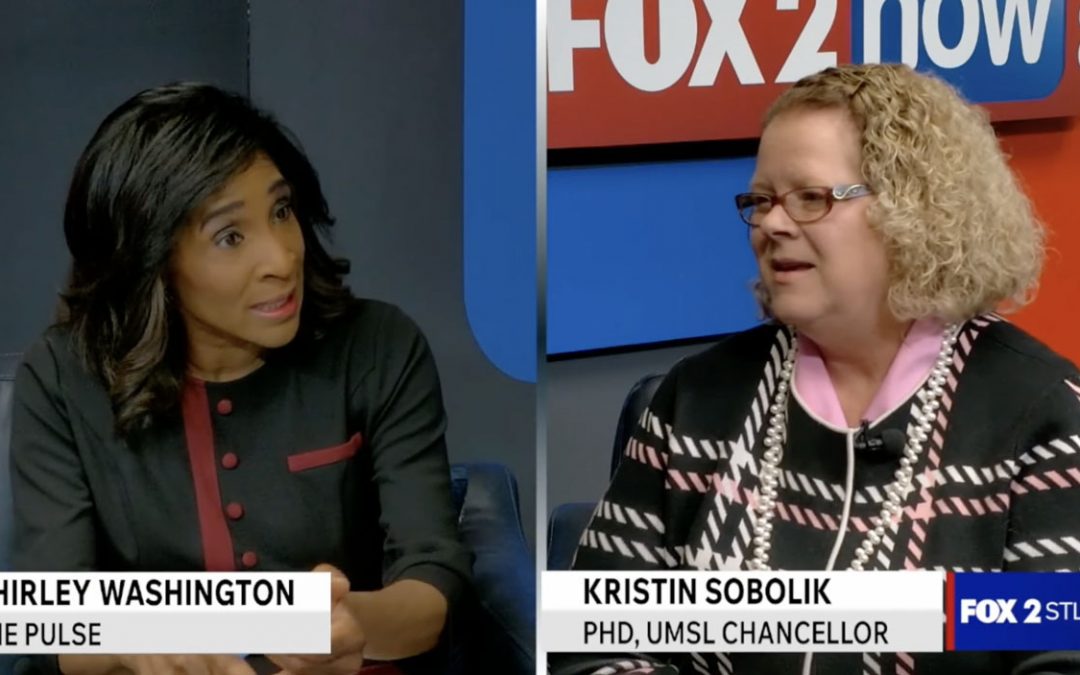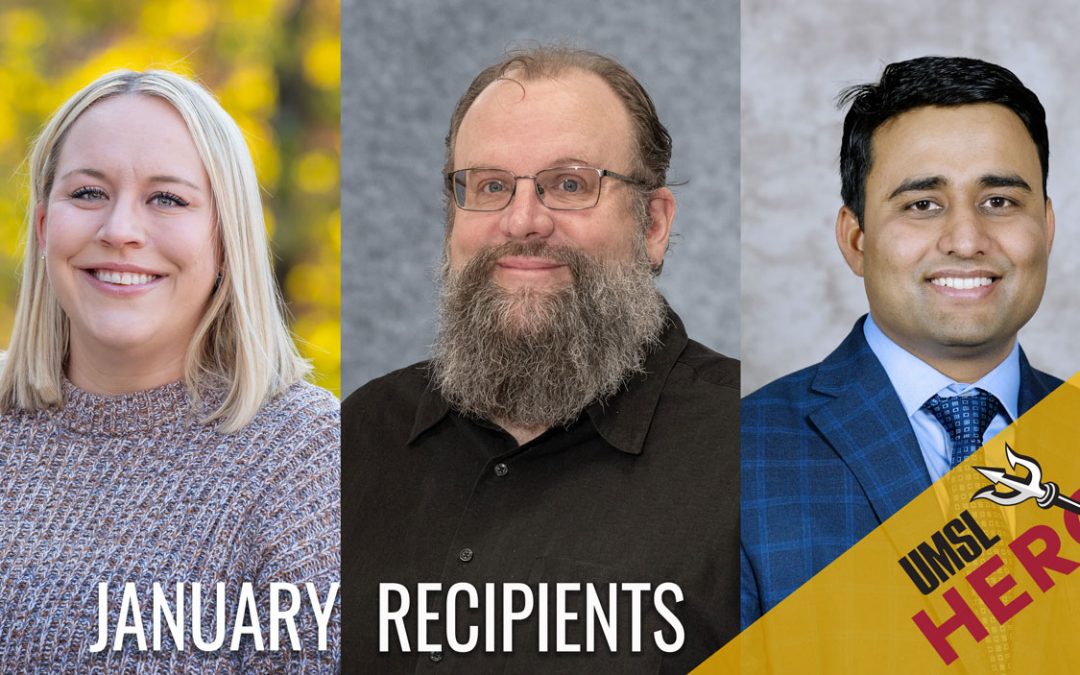
Maribeth Rezey is one of six doctoral students nationwide, including two from UMSL, conducting research as part of the Bureau of Justice Statistics Graduate Research Fellowship Program. (Photo by August Jennewein)
Most days, Maribeth Rezey can be found holed up in front of the computer screen in her small office on the third floor of Lucas Hall, poring through data from child protective services agencies across the United States.
Rezey is working toward a PhD in criminology and criminal justice from the University of Missouri–St. Louis and has made analyzing trends in child abuse and neglect – said to be declining over the past two decades – the focus of her dissertation.
“I’m looking at the ability of the National Child Abuse and Neglect Data System, which we call the NCANDS, to measure change over time in child victimization,” Rezey said. “So the first component of the dissertation looks at these national trends and tries to tease out whether the NCANDS data set is capable of measuring changes in the victimization of children.
“After the validity and reliability of the data for measuring those trends is established, I look at the state-level trends in child abuse and neglect available in the NCANDS – broken out by child physical abuse, child sexual abuse and child neglect – and I test a handful of hypotheses related to why the decline occurred.”
Last year she received a grant from the Bureau of Justice Statistics to help fund her work.
In all, six doctoral students nationwide shared a total of $569,623 after being selected to take part in the first year of the BJS Graduate Research Fellowship Program. Two came from UMSL – Rezey and CheyOnna Sewell, whose project is titled “An Investigation of Violence against Women, Gender Inequality, and Racial Inequality.”
“I know there are a lot of smart PhD students around the country, but it takes special effort and special enthusiasm for your research to put together a proposal in the middle of your doctoral studies,” said Janet Lauritsen, Curator’s Distinguished Professor in the Department of Criminology and Criminal Justice. “We’re very proud that both of those students took the initiative and got it together and learned about all the aspects of grant submission and competitive research funding. It’s going to look excellent on their record, and it’s going to do well for them when they try to continue their research in the future.”
Rezey’s interest in studying child victimization has been with her since before she began her undergraduate studies.
“I never understood how someone could harm a child,” she said. “I never understood crimes against children.”
When she was younger, she thought she might try to attack the problem as a lawyer.
“Throughout college, I set myself up with internships and jobs and everything to make myself a great candidate to go to law school and to get into a great law school,” said Rezey, who earned a bachelor’s degree from Villanova University. “But I decided that wasn’t for me. I couldn’t see myself happy in my 30s and 40s as a lawyer.”
Rezey, a native New Yorker, wound up taking a year off after graduation in 2005 and went to Australia while she contemplated alternative career paths.
She decided to study criminology and criminal justice and enrolled in the graduate program at the University of Maryland-College Park, which U.S. News & World Report ranks as the nation’s top program.
It was the hope of working with Lauritsen that prompted Rezey to leave Maryland and come to UMSL – another top-five graduate program – for her doctoral studies.
“I wanted to study victimization,” Rezey said. “I’m a quantitative researcher. Janet is a quantitative researcher. I didn’t have anyone to work with at Maryland in the area of victimization.”
She added: “I think a lot of our PhD students here have very similar stories – that they’re drawn to UMSL because of one faculty member or the whole package. All of our faculty are such great scholars in our field. Thankfully, when I got here, Janet was willing to work with me, and she’s mentored me for the past five years.”
Rezey has worked as a research assistant for Lauritsen, who in turn has served as her advisor and the chair of her dissertation committee.
“She’s a fantastic doctoral student,” Lauritsen said. “She is very hard-working, loves solving problems and data analysis, and she’s a very careful researcher.”
It was Rezey’s idea to delve into the data showing declines in child abuse over the last 20-plus years and her idea to submit her proposal to the Bureau of Justice Statistics so she could be considered for its new fellowship program.
“What BJS is especially interested in is one of the first parts of her dissertation, which assesses the validity of those trends over time by comparing them with other data on child victimization that have never been exploited for that purpose,” Lauritsen said. “So she’s going to take a look at other victimization survey data and child homicide data, which are fairly well measured, and make some assessments about whether those trends have declined the way the NCANDS agency data suggests it has, and if it has, whether it has done so for all states in the country. So it’s really important work.”
Rezey is also testing some hypotheses proposed by criminologists that aim to get at some root causes for the declines.
One such hypothesis has been proposed by University of New Hampshire victimization scholar David Finkelhor. He suggests the increased use of medications for the purpose of treating attention deficit hyperactivity disorder in children and depression or anxiety in adults together has calmed environments that might otherwise be combative and lead to instances of abuse.
“It sounds like it makes sense. It sounds like it could be the case. But is it really the case?” Rezey said. “This is a hypothesis that has not yet been tested.”
There are at least a half a dozen others.
Rezey is still in the middle of her analysis and not ready to draw any conclusions, but she is scheduled to present her findings at the American Society of Criminology conference in November in New Orleans.
She’s hoping to wrap up her dissertation by March and graduate in May. There will be other reports she will have to complete after that as part of the fellowship, and she will travel to Washington, D.C., next summer to present her findings to BJS.
Rezey would like to have her next career step figured out by then.
“I’m actually on the job market right now,” she said. “I’m hoping to have a tenure track assistant professor position in a criminology/criminal justice program somewhere, ideally back east where I’m from. I ultimately want to continue to have the opportunity to teach and do research and hopefully be as successful as those in this department are. That’s my goal. We’ll see how long it takes to get there.”















